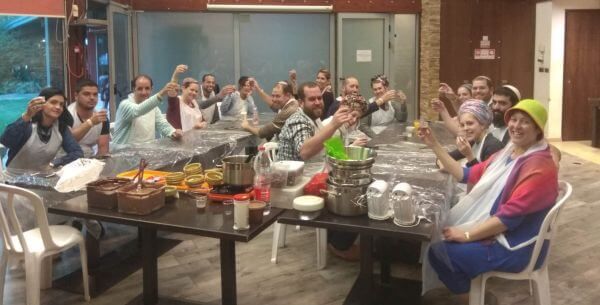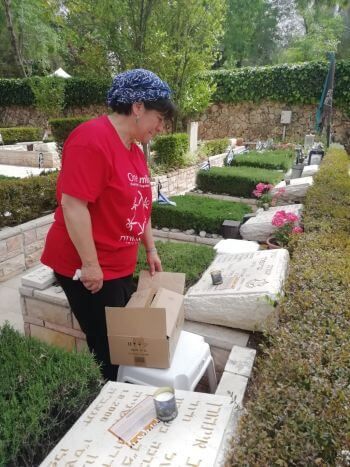This guest post is by Margot Dudkevitch of OneFamily, a Jerusalem-based organization that helps Israeli victims of terror.
A terror attack occurs within minutes, but it changes your life forever.
A bomb explosion, a stabbing, a firebomb attack, a rocket attack, a shooting attack, a kidnapping — all leave a trail of death and destruction. Lives are turned upside down, what was, is no longer, and people are left to bear the physical and emotional scars for the rest of their lives.
You can never fully fathom the devastation it causes to families who lose loved ones or are injured in attacks. Their lives are plunged into chaos and despair. You may no longer read about them in the newspapers, they no longer make headlines, but their lives changed forever.
A person driving home, enjoying a walk, shopping or just sitting at home and suddenly an attack occurs, and their entire world is turned upside down, without warning or preparation. The trauma they experience can cause feelings of helplessness, inability to function and extreme mental and physical anguish. The situation impacts the entire family and friends.
Many of those injured in terror attacks also suffer severe emotional problems. The organization has created a unique program for those ailing from post-traumatic stress disorder (PTSD). It is designed to help sufferers and their spouses develop skills to cope with their trauma, improve their relationship with each other and their children.
Join the fight for Israel’s fair coverage in the news
Figures published by the Defense Ministry ahead of Remembrance Day for Israel’s Fallen state 23,745 Israelis have been killed in war and terror attacks since 1860. One hundred and four new names were added to the list since last year’s Memorial Day. Fifty six of that number were soldiers and policemen, and forty disabled veterans who passed away due to complications from injuries sustained during their military service.
OneFamily was formed almost 18 years ago. At the time, Michal Belzberg was about to celebrate her Bat Mitzva in Jerusalem when there was a suicide bomb attack at the Sbarro pizza café. Fifteen people were murdered and 85 injured. Michal decided to cancel her celebrations and asked family and guests to donate to the wounded.
As the wave of attacks continued to ravage the country, Michal’s parents Chantal and Marc Belzberg realized there was an immense need to care for the victims of terror and provide them with emotional and financial support. OneFamily was formed.
Indeed, since its launch, the organization has provided more than $55 million in assistance to more than 4,000 victims of terror and their families.
“We strive to rehabilitate, reintegrate and rebuild the lives of thousands of Israelis affected by terror,” says Chantal Belzberg, the CEO of OneFamily. The organization provides a comprehensive blend of financial assistance, therapeutic programs, workshops, retreats and legal aid regardless of race or religion, Belzberg notes.
The terror victims’ stories
To protect their privacy, the terror victims shared their stories on condition of being identified only by their initials.
S.B. lives in Beit Shean with his wife and four children. He was seriously injured in a shooting attack 17 years ago in his hometown. Ever since his injury he has been unable to work, his mental state has deteriorated and today he also suffers from heart problems. His wife works in a day care center and aside from the small disability pension S. receives they are struggling to pay the bills at the end of each month. OneFamily coordinators have been in contact with him ever since he was injured. The coordinators visit the family frequently and have also helped pay for medical treatment, medicines he receives and additional financial aid to assist the family.

H.N. who lives in Haifa, is in her mid forties, is married with three children. Eighteen years ago she was injured in a suicide bomb attack in Kfar Saba. She suffered severe injuries and underwent a long drawn-out rehabilitation process. Ten years ago she was diagnosed with cancer which has spread. She frequently goes to hospital to undergo chemotherapy and radiation treatments. She is unable to work and her husband is the sole earner. “We visit frequently, and have given the family funds to pay for camps for the children. We provide support and encouragement and helped to pay some of the debt incurred,” a OneFamily case worker said.
Seventeen couples who suffer from PTSD were asked to fill out a questionnaire after participating in a recent OneFamily workshop. The majority said they felt it contributed greatly to improving their quality of life. Many felt that meeting others who suffered similar emotional problems helped to boost their self-confidence and showed them it was worthwhile investing in their relationships.
For many terror victims it is not only the injury and the emotional scars they are left to bare for their entire lives. N.N who was seriously injured in a stabbing attack in August 2017 is still being treated for his wounds. Today he walks with crutches. The attack also affected his voice box making it difficult for him to speak. Severely traumatized from the attack he is unable to work, unable to concentrate. Money is tight.
The G. family lives in Ashkelon. Five years rockets exploded twice near their home. The father was present in both attacks, and the daughter in one. Both were severely traumatized. The daughter has a companion to accompany her to school and at nights sleeps with her mother, she is too scared to sleep alone The father who used to repair air conditioners is unable to work. He was recently diagnosed with a heart condition and is hospitalized in the Barzilai Hospital periodically.
N.S.G. immigrated from Ethiopia in 1994 and is married with five children. In 2001 she was injured in a bus bomb attack in Hadera. She was severely traumatized and is currently hospitalized in the psychiatric ward, unable to function or care for her children and home. The husband is the sole wage earner. When they return from school the eldest child takes care of the younger siblings, cooks and cleans until their father comes home.
Retreats provide the opportunity for victims of terror to step outside their regular lives and focus on their trauma together with others. Many experience loneliness, face difficulties in their daily lives and are unable to shake free from the trauma. Spending time with counselors, professionals and others in their group helps them to talk about their struggles, reminds them they are not alone in their battle to move forward. Those participating said the meetings gave them an incentive to keep on living and the guidance and support they received helped them to stand on their feet.

Every day is ‘Remembrance Day’
On Yom HaZikaron (Remembrance Day) to honor Israel’s fallen, soldiers, members of the security forces and victims of terror, the entire country comes to a standstill. But, for the families whose lives have been touched by terror, every day is “Remembrance Day.”
Speaking at the annual Remembrance Day service last year hosted by OneFamily, Noa Bukaris whose sister Hadar was murdered in a stabbing attack at the Gush Etzion Junction three and a half years ago said for her Remembrance Day is a day of mixed emotions. “The announcement that Hadar was dead, pierced through me. A sentence that cut through me, I could feel it cutting inside me, splitting my life and perspective into two. A sharp sentence and a sharp knife, both divide and slice. And just like the knife, they both kill.”
Iris Yifrach spoke of her son Eyal who was kidnapped and murdered five years ago along with his friends Naftali Fraenkel and Gilad Shaer. “On Remembrance Day there is a bleeding silence, perhaps I am looking for myself? Iris who was once happy and content, the family that was once complete.”
Art classes, ceramics, yoga and exercise classes offer bereaved and injured victims of terror a brief respite from their grief. A reason to leave the house, or get up in the morning, something to look forward to.
R.L., whose son was murdered eight years ago in an attack said already during the shiva, OneFamily staff members visited her home. Ever since she says she tries to attend as many different activities as possible. “It is nice to meet other bereaved mothers. It gives me a purpose to come and try out the different activities. For a short time I can concentrate on other things, laugh a bit,“ she said.
A.B., who was seriously injured in a bus bomb attack in 2003 says meeting others who were also injured in attacks helps to strengthen her and gives her an incentive to move forward.
“OneFamily was created as a result of the unfortunate needs our society has evinced. The tragedies in OneFamily include not only children who have lost both parents, bereaved parents, spouses and siblings, but also those wounded by terror and their families. We make sure they always know they have someone to turn to,” says Belzberg.
Featured image: Unsplash/Brandon Lane;
Before you comment on this article, please note our Comments Policy. Any comments deemed to be in breach of the policy will be removed at the editor’s discretion.

